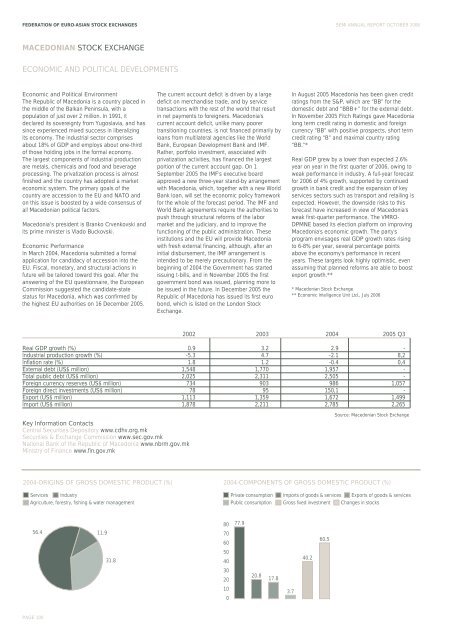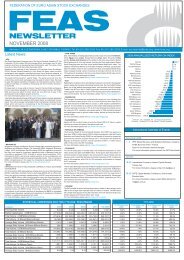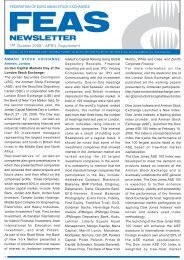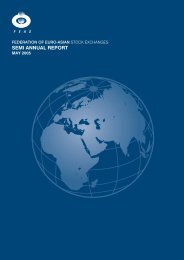Download - FEAS
Download - FEAS
Download - FEAS
Create successful ePaper yourself
Turn your PDF publications into a flip-book with our unique Google optimized e-Paper software.
FEDERATION OF EURO-ASIAN STOCK EXCHANGES SEMI ANNUAL REPORT OCTOBER 2006<br />
MACEDONIAN STOCK EXCHANGE<br />
ECONOMIC AND POLITICAL DEVELOPMENTS<br />
Economic and Political Environment<br />
The Republic of Macedonia is a country placed in<br />
the middle of the Balkan Peninsula, with a<br />
population of just over 2 million. In 1991, it<br />
declared its sovereignty from Yugoslavia, and has<br />
since experienced mixed success in liberalizing<br />
its economy. The industrial sector comprises<br />
about 18% of GDP and employs about one-third<br />
of those holding jobs in the formal economy.<br />
The largest components of industrial production<br />
are metals, chemicals and food and beverage<br />
processing. The privatization process is almost<br />
finished and the country has adopted a market<br />
economic system. The primary goals of the<br />
country are accession to the EU and NATO and<br />
on this issue is boosted by a wide consensus of<br />
all Macedonian political factors.<br />
Macedonia’s president is Branko Crvenkovski and<br />
its prime minister is Vlado Buckovski.<br />
Economic Performance<br />
In March 2004, Macedonia submitted a formal<br />
application for candidacy of accession into the<br />
EU. Fiscal, monetary, and structural actions in<br />
future will be tailored toward this goal. After the<br />
answering of the EU questionnaire, the European<br />
Commission suggested the candidate-state<br />
status for Macedonia, which was confirmed by<br />
the highest EU authorities on 16 December 2005.<br />
The current account deficit is driven by a large<br />
deficit on merchandise trade, and by service<br />
transactions with the rest of the world that result<br />
in net payments to foreigners. Macedonia's<br />
current account deficit, unlike many poorer<br />
transitioning countries, is not financed primarily by<br />
loans from multilateral agencies like the World<br />
Bank, European Development Bank and IMF.<br />
Rather, portfolio investment, associated with<br />
privatization activities, has financed the largest<br />
portion of the current account gap. On 1<br />
September 2005 the IMF's executive board<br />
approved a new three-year stand-by arrangement<br />
with Macedonia, which, together with a new World<br />
Bank loan, will set the economic policy framework<br />
for the whole of the forecast period. The IMF and<br />
World Bank agreements require the authorities to<br />
push through structural reforms of the labor<br />
market and the judiciary, and to improve the<br />
functioning of the public administration. These<br />
institutions and the EU will provide Macedonia<br />
with fresh external financing, although, after an<br />
initial disbursement, the IMF arrangement is<br />
intended to be merely precautionary. From the<br />
beginning of 2004 the Government has started<br />
issuing t-bills, and in November 2005 the first<br />
government bond was issued, planning more to<br />
be issued in the future. In December 2005 the<br />
Republic of Macedonia has issued its first euro<br />
bond, which is listed on the London Stock<br />
Exchange.<br />
In August 2005 Macedonia has been given credit<br />
ratings from the S&P, which are “BB” for the<br />
domestic debt and “BBB+” for the external debt.<br />
In November 2005 Fitch Ratings gave Macedonia<br />
long term credit rating in domestic and foreign<br />
currency “BB” with positive prospects, short term<br />
credit rating “B” and maximal country rating<br />
“BB.”*<br />
Real GDP grew by a lower than expected 2.6%<br />
year on year in the first quarter of 2006, owing to<br />
weak performance in industry. A full-year forecast<br />
for 2006 of 4% growth, supported by continued<br />
growth in bank credit and the expansion of key<br />
services sectors such as transport and retailing is<br />
expected. However, the downside risks to this<br />
forecast have increased in view of Macedonia's<br />
weak first-quarter performance. The VMRO-<br />
DPMNE based its election platform on improving<br />
Macedonia's economic growth. The party's<br />
program envisages real GDP growth rates rising<br />
to 6-8% per year, several percentage points<br />
above the economy's performance in recent<br />
years. These targets look highly optimistic, even<br />
assuming that planned reforms are able to boost<br />
export growth.**<br />
* Macedonian Stock Exchange<br />
** Economic Intelligence Unit Ltd., July 2006<br />
2002 2003 2004 2005 Q3<br />
Real GDP growth (%) 0.9 3.2 2.9 -<br />
Industrial production growth (%) -5.3 4.7 -2.1 8,2<br />
Inflation rate (%) 1.8 1.2 -0.4 0,4<br />
External debt (US$ million) 1,548 1,770 1,957 -<br />
Total public debt (US$ million) 2,025 2,311 2,505 -<br />
Foreign currency reserves (US$ million) 734 903 986 1,057<br />
Foreign direct investments (US$ million) 78 95 150,1 -<br />
Export (US$ million) 1,113 1,359 1,672 1,499<br />
Import (US$ million) 1,878 2,211 2,785 2,265<br />
Key Information Contacts<br />
Central Securities Depository www.cdhv.org.mk<br />
Securities & Exchange Commission www.sec.gov.mk<br />
National Bank of the Republic of Macedonia www.nbrm.gov.mk<br />
Ministry of Finance www.fin.gov.mk<br />
Source: Macedonian Stock Exchange<br />
2004-ORIGINS OF GROSS DOMESTIC PRODUCT (%)<br />
Services Industry<br />
Agriculture, forestry, fishing & water management<br />
2004-COMPONENTS OF GROSS DOMESTIC PRODUCT (%)<br />
Private consumption Imports of goods & services Exports of goods & services<br />
Public consumption Gross fixed investment Changes in stocks<br />
80<br />
77.9<br />
56.4<br />
11.9<br />
70<br />
60<br />
60.5<br />
31.8<br />
50<br />
40<br />
40.2<br />
30<br />
20<br />
20.8<br />
17.8<br />
10<br />
0<br />
3.7<br />
PAGE 100
















